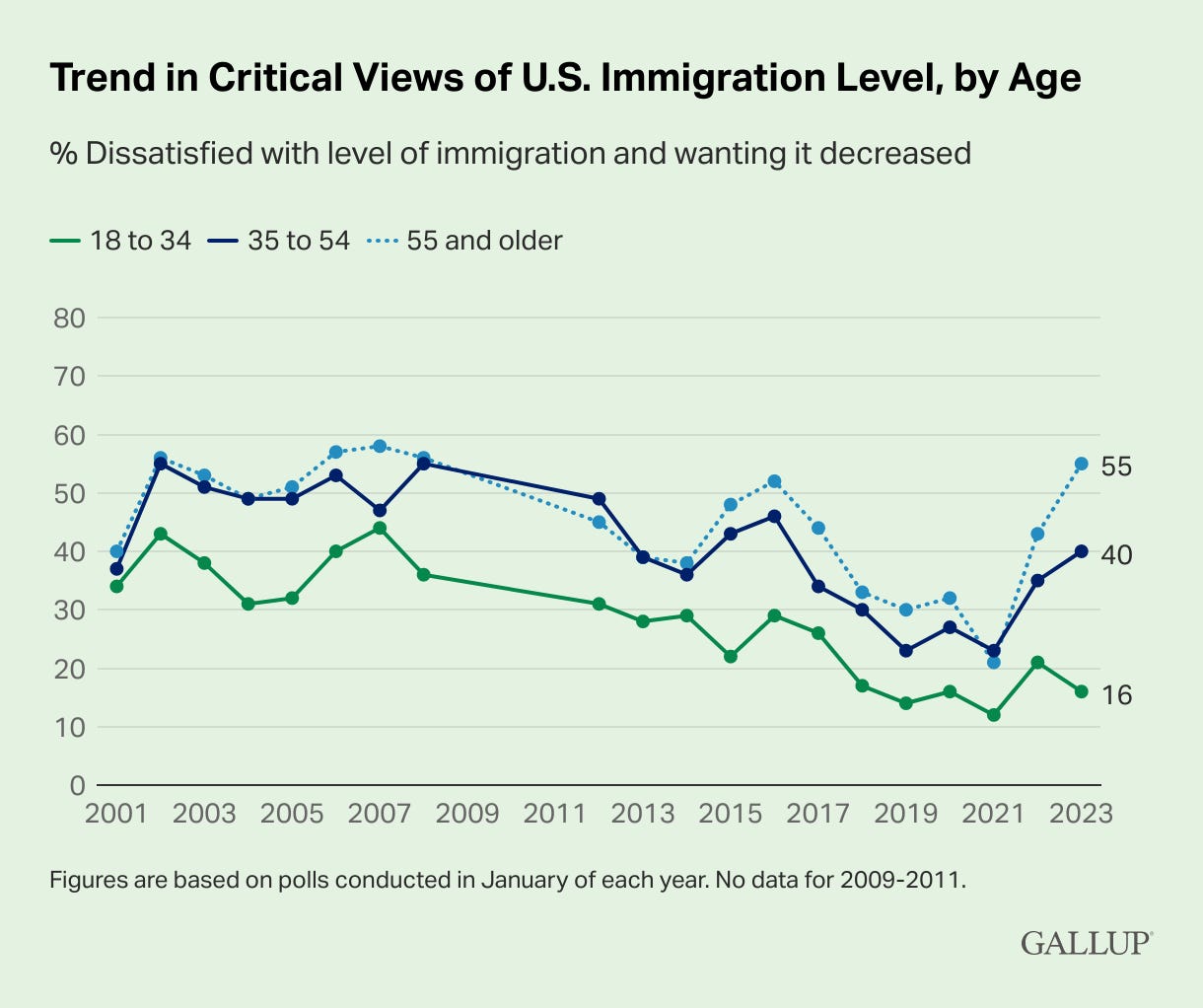The Last Gasp of Anti-Immigration Sentiment?
Reflecting on the latest Gallup poll on U.S. public attitudes towards immigration

Axios’ Stef Knight reports that American attitudes towards immigration have soured over the past few years: “The share of Americans wanting less immigration has spiked across the board since President Biden took office in 2021, according to a new Gallup survey. Just 28% of Americans say they're satisfied with immigration levels in the U.S. — the lowest in a decade. Nearly 2/3 of the dissatisfied want less immigration.”
As someone who thinks that America’s greatest comparative advantage is attracting people from elsewhere in the globe and turning them into awesome Americans, this is a depressing finding. As a political scientist with some familiarity about the dynamics of public opinion polling it’s unsurprising. Affective polarization is a feature of 21st century American politics. Public support for immigration surged during the Trump years, in no small part because of Trump’s strong desire for restricting immigration. Biden is hardly an open borders guy, but he is clearly less severe on this issue than the former president. As a result, public opinion has moved in the other direction.
At least, that is my theory. Gallup’s Lydia Saad offers an additional explanation:
The recent shift in U.S. attitudes no doubt reflects the situation at the Southern border, where the U.S. government reported a fourfold annual increase in migrants attempting to enter the U.S. in 2021, with the figure rising to 1.7 million. More than 2 million such migrant encounters occurred in 2022. And the Department of Homeland Security estimates the figure could double if a pandemic-era policy allowing border agents to expel migrants without giving them an opportunity to seek asylum is revoked.
Fair enough: Americans really do not like policy problems in which the government seems powerless to fix the situation. Biden, like Trump before him, faces this conundrum. The failure to stem the tide of migrants from crossing the southern border feeds a perception that the problem is an intractable one.
One solution to this, of course, would be to lower the barriers to legal migration into the United States. If the problem is the flow of undocumented migrants, require fewer documents and accept more legal immigrants! This seems like a particularly smart thing to do in an economy that is demanding lots of new hires in sectors that traditionally rely on immigrants!
Given the current state of public opinion, however, this is not a politically feasible solution. This leaves hard-working staff here at Drezner’s World frustrated. More migrants would alleviate U.S. demographic pressures. But the current politics on this are not propitious for immigration reform.
The Gallup poll did offer some interesting hints about the future, however. The poll showed that the primary source of unhappiness about immigration comes from senior citizens:
It’s interesting to see that the 18 to 34 demographic are the Americans most enthusiastic for more immigration. That could be due to a number of factors, including the fact that a greater fraction of younger Americans are likely to be immigrants or the children of immigrants.
It is a tradition for younger, more liberal Americans to grow up and become more traditional, conservative Americans. If this trend holds for attitudes about immigration, then the dysfunctional status quo will persist. If i does not, however, then the United States might be witnessing the 21st century peak of anti-immigration sentiment.



Humans have a tribal fear of The Other, but this is reptile-brain stuff. I am a very old hermit and do not know any of these encouraging younsters personally. I wish I did. I started out radical and got more so with advancing age. One of the fastest shifts in public opinion in my lifetime happened when more and more gays felt free to come out of the closet and people realized, hey, that's my neighbor... or my cousin...not so scary. And we went from even Obama being against same-sex marriage to Obergefell being the law of the land very quickly. Maybe young people just not having it with being afraid of immigrants will produce a similar change.
Without strong domestic demand there is no growing economy, and domestic demand is impossible to maintain without growing population. The problem is not in what seniors think and say, the problem is in explaining how many new Americans of certain age you guys need and what you can do to assimilate them into your own culture. Higher demand in high end products domestically means more citizens with higher income but urbanizing economy is all about shrinking population, so you probably should be solving a multi faceted problem of a) reforming immigration policy towards bringing in more educated/skilled ones - it is where I totally agree with you , and b) assimilating them into domestic culture/norms - because xenophobia is a real thing, you know, and c) tell your fellow Americans about your plans in simple way.